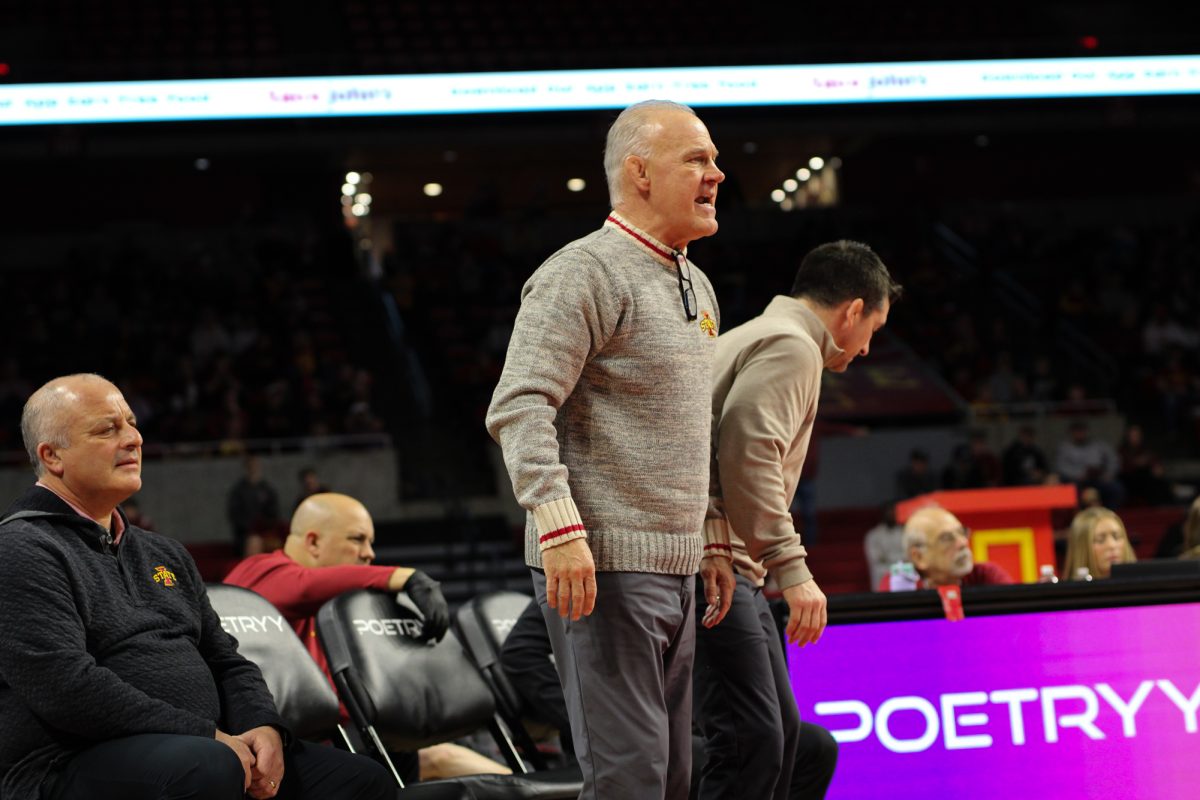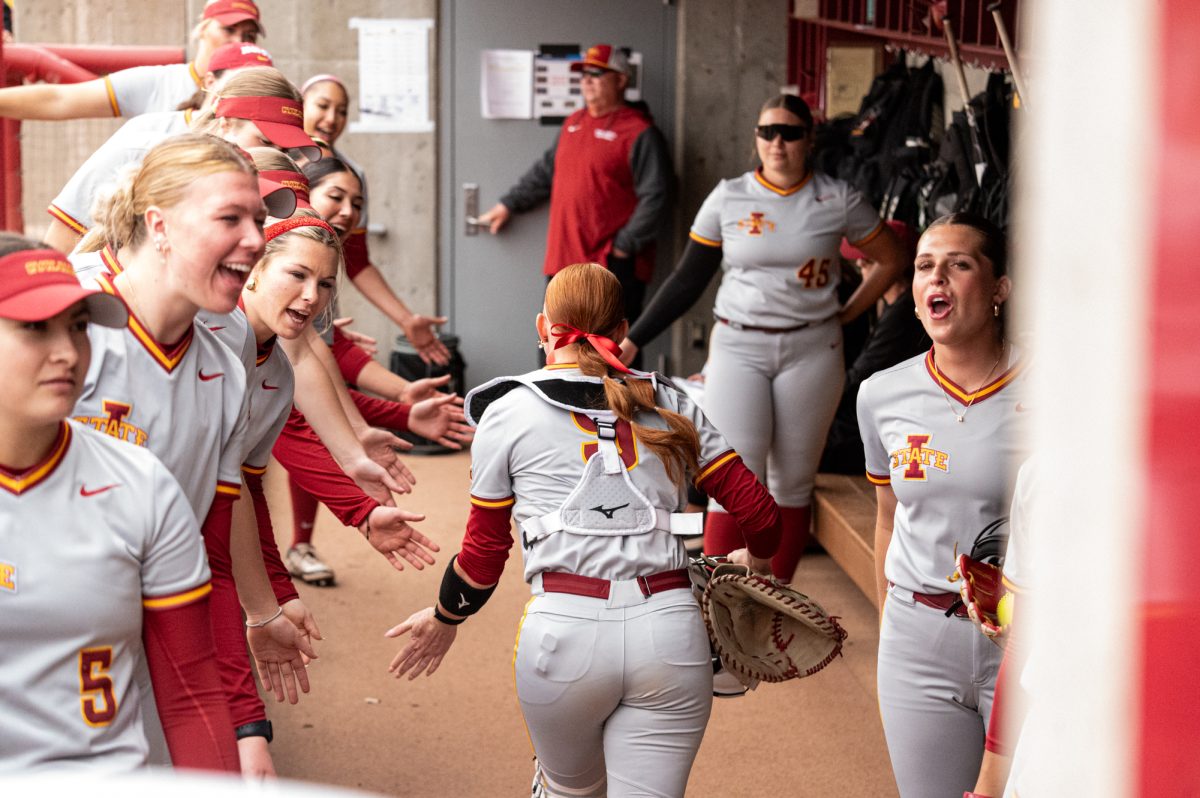Gymnasts still living their legacy today
April 29, 2004
Editor’s note: This is the third and final article in a series highlighting the accomplishments of the former ISU men’s gymnastics team. The team was founded 1961 and was eliminated in 1994.
By John Kauffman
Daily Staff Writer
Just moments before his Golden Gophers were set to face off against the ISU women’s gymnastics team, Minnesota co-head coach Jim Stephenson looked up to the Hilton Coliseum rafters in search of a memory.
Amongst the multitude of championship banners that proudly adorn Hilton’s ceiling, there it was. Stitched in red on a white background, it was a single banner to serve forever as the last physical reminder of a legacy which is now left only to the record books.
After reflecting upon the banner’s bold lettering, “Men’s Gymnastics — NCAA National Champions —1971, 1973, 1974,” Stephenson turned to a fellow Cyclone teammate from the 1973 team and dolefully said, “People have no idea what that [accomplishment] really meant; how that whole experience has radiated out over the years. That’s really what that banner is all about.”
Gagnier’s Hilton Magic lives on
Stephenson, an All-American and the 1973 Big Eight all-around champion, said he vividly remembers the Cyclones’ national championship wins. Looking back on his experience, Stephenson said the team’s success was remarkable considering collegiate gymnastics was in the height of its glory, with approximately 172 programs nationwide.
The results, however, don’t surprise Stephenson, he said. He said the team was bound to succeed while under the watchful eye of head coach Ed Gagnier.
Stephenson said Gagnier had the unique ability to take a very diverse group of young men and create an environment that was very competitive internally for starting spots, but yet remained united toward a common team goal.
“[Gagnier] really understood the chemistry and knew how to get the best results [out of us],” Stephenson said.
“He had a charm about him that was magical. [He] was continuously positive in his approach. Coach believed that there was this greatness inside of you, and he was going to help you learn how to use that.”
Former national champion and 1980 Olympic team member Ron Gallimore said he fondly remembers the mystical smile and inspirational “It’s going to be a great day,” from Gagnier, which greeted him each day at practice.
“No matter how I felt, all I had to do was walk through the gate of the gym, and he would help motivate me to do what I didn’t think I could do,” Gallimore said.
Most theories say the best coaches are those people who get the most out their athletes, Stephenson said. Gagnier’s approach was quite the opposite.
“[Gagnier was all about] teaching you how to get the most out of yourself,” Stephenson said. “As a life lesson, that is infinitely valuable.”
Stephenson said he can’t think of one team member, regardless of his chosen career, who hasn’t tried to transform and apply that same lesson in his own personal or professional life.
Forever changing the face of gymnastics history
Despite the years of inspiration and success, 1994 brought increasing Title IX pressures and the redistribution of ISU athletic funds, leading to the elimination of the team.
Though many of the lessons learned by these gymnasts in the gym are now being applied outside the gymnastics realm, Stephenson and Gallimore are among those still seeing that Iowa State’s success continues to impact the sport today.
“Every place I’ve ever coached, I have, everyday, thought about how Ed Gagnier ran his program,” Stephenson said. Now in his 12th year as coach at Minnesota, Stephenson said he tries to closely employ the methods used by Gagnier.
Stephenson often reflects on how Gagnier talked to, motivated and inspired his athletes. He said he could only hope the environment he creates at Minnesota will allow the athletes in his program to leave with the same understanding of self-confidence he learned from Gagnier.
Gallimore said the same about the coaching experiences he had after college.
“I wanted to make [my athletes] happy that they just had made it through the door,” Gallimore said.
“[I wanted to] make them believe they were going to accomplish something they didn’t think they could that day.”
Gallimore can still remember one-day in particular when Gagnier pushed him beyond his own limitation.
Known for his dynamic vaults, Gallimore had notched countless victories, often scoring a near-perfect 9.90.
Just when Gallimore had conceded that it wasn’t possible to ever receive a perfect score, it happened.
“It felt as good as anything I’d ever done, and I stuck it cold,” Gallimore said. He said he stood in shock and elation as he became the first gymnast in NCAA history to receive a perfect 10.0.
Though Gallimore said the atmosphere the program provided allowed him to reach some of his greatest athletic achievements — earning a 10.0 on vault and a spot on the 1980 Olympic team — he said graduating with a college degree ranks as one of his greatest accomplishments.
“It was the sport that really put me in school; it was hard to think past gymnastics,” Gallimore said. “I never really saw myself finishing, but I studied really hard because I wanted to remain eligible.
“[Graduating] was a huge, huge point in my life.”
Without his degree, it would have been hard for Gallimore to secure his present position as Senior Men’s Program Director for USA Gymnastics, one of the most prestigious and influential positions in the sport.
Currently, Gallimore is focusing on helping the U.S. men’s team prepare for the Olympic games in Athens, Greece, this summer. When Gallimore took the position 10 years ago, the United States was ranked ninth in the world and has since moved up to second.
Leading the U.S. men into Athens will likely be Paul Hamm, who in 2003 became the first man from the United States to ever win the all-around world championship title. Ironically, Hamm was also the prot‚g‚ of another ISU men’s gymnastics team alum, Stacy Maloney.
“I’m pretty excited about what’s happening with the men’s program right now; we’re going into the Olympics with a chance to challenge for top honors. It’s been 20 years since the men’s team has been up on the awards stand,” Gallimore said. “I feel they are capable.”






